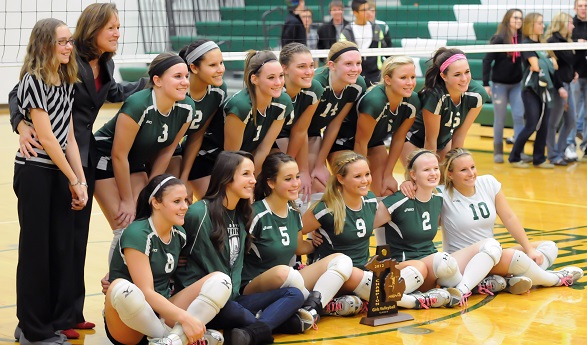
Wise Words for Coaches New (and Old)
September 13, 2013
By Geoff Kimmerly
Second Half editor
Every fall brings a new beginning for those who live by the high school calendar. And among those experiencing a new start are first-year high school coaches eager to begin their careers in educational athletics.
But what knowledge do they bring into their first coaching jobs? Most if not all played at the high school level, and many played at the college level as well. Some have served as assistants or coached youth teams. But high school coaching comes with its own set of challenges requiring an advanced set of skills – skills that are passed on annually as part of the Michigan High School Athletic Association’s Coaches Advancement Program.
To assist in giving some of our new coaches a running start, we tapped into the knowledge of three of our Coaches Advancement Program instructors for advice they give those just starting out:
 Jean LaClair began this fall 12th in MHSAA volleyball history with 861 wins since becoming a varsity head coach in 1987. She’s coached at Midland Dow, Pinconning and currently Bronson, where she’s also the athletic director and an assistant principal. She’s also served as an MHSAA official and contributed to the Women in Sports Leadership porgram.
Jean LaClair began this fall 12th in MHSAA volleyball history with 861 wins since becoming a varsity head coach in 1987. She’s coached at Midland Dow, Pinconning and currently Bronson, where she’s also the athletic director and an assistant principal. She’s also served as an MHSAA official and contributed to the Women in Sports Leadership porgram.
 Ken Semelsberger is a recent inductee into the Michigan High School Football Coaches Hall of Fame and spent 33 years at Port Huron High School as a coach and athletic administrator. He also coached football at Detroit Servite and has led teams in basketball, softball and baseball. Semelsberger returned to the Port Huron sideline four seasons ago as the varsity’s line coach.
Ken Semelsberger is a recent inductee into the Michigan High School Football Coaches Hall of Fame and spent 33 years at Port Huron High School as a coach and athletic administrator. He also coached football at Detroit Servite and has led teams in basketball, softball and baseball. Semelsberger returned to the Port Huron sideline four seasons ago as the varsity’s line coach.
 Penny Allen-Cook currently is an athletic consultant and in her fourth season coaching the Freeland varsity volleyball team. She also coached volleyball at Alma College, and is a former assistant commissioner of the Great Lakes Intercollegiate Athletic Conference. She served as an assistant athletic director at Alma College and director of compliance at Saginaw Valley State University.
Penny Allen-Cook currently is an athletic consultant and in her fourth season coaching the Freeland varsity volleyball team. She also coached volleyball at Alma College, and is a former assistant commissioner of the Great Lakes Intercollegiate Athletic Conference. She served as an assistant athletic director at Alma College and director of compliance at Saginaw Valley State University.
All were asked the following questions during separate interviews. But not surprisingly, some of their answers were similar – especially those that emphasized dealing with parental pressures and why they as coaches continue to return to the sideline every year.
Many of their answers also segued well into each other, so we’ve blended them for one longer conversation filled with wisdom beneficial to new and veteran coaches alike.
What do you tell those who are interested in becoming high school coaches?
Semelsberger: “Basically, it’s one of the most fulfilling things you’ll ever do. And it’s also one of the hardest things you’ll ever do. I try to explain that it’s not just about going to practice and coaching kids today. That’s the easy part. It’s also preparing for practice, (gaining) the knowledge of what to do in certain situations from the game itself all the way to training procedures, injury procedures and liability issues. That’s all part of the coaching realm.”
LaClair: “My biggest concern with young coaches is them getting driven out by parents really early. You’ve got to have thick skin, and you’ve got to have great relationships with parents. You can’t be afraid to talk to parents.”
Allen-Cook: “Certainly to coach is an extremely rewarding thing to do. But you can’t get into it for the money. You get into it for the things that last for a lifetime. My first year I started coaching was back in 1986, and I’ve kept in touch with those kids. (Coaching) can’t be for money or wins and losses, but the differences you make in lives.”
Semelsberger: “Probably not until after the first year do you realize all that’s entailed in coaching. (Coaches) say, ‘Once I really got into and do it, after the first time, it was a lot more than I thought.’ They say, 'What can you tell me to help me?'”
How do you encourage coaches who have become frustrated with the profession?
Allen-Cook: “It’s easier to get discouraged nowadays more than it used to be, and a common thing that discourages is the parent involvement is at a different level than it ever was 20 years ago. The key is to remember, and it’s hard for young coaches who aren't parents, but you tell them to step back and imagine what it feels like if you were the parent.”
LaClair: “I do try to get all young coaches a mentor, someone to talk with. We all get frustrated; we all have to vent, and we need the right person to talk it through with and come up with alternative ways (of dealing with situations).”
Semelsberger: “The one thing I tell them is to remember that what’s most important out there is how they influence athletes. I want to see them doing positive things with our athletes, stressing grades and sportsmanship. I hired a hockey coach once, and I told him to clean up the program. I don’t care if you win; I want our grades to be good, community involvement, and the wins and losses will come. If you stay with it, hang in there, it will come.”
Allen-Cook: “If they approach things the right way, in as few years as four or five, if they stick it out, they’ll learn the positives outweigh the negatives. I’m always encouraging them to stick it out a few more years until they can figure out their true philosophy, why they want to coach.”
What specific situations do you tell new coaches to prepare for, and how?
LaClair: “For me as a coach, the parent/athlete meeting is mandatory. If a parent comes to me with a question during the year, I say, ‘Do you remember the parent/athlete meeting? We discussed that.’ It sets the tone and tells parents how proactive you are as a person, how organized and prepared you are.”
Semelsberger: “When you’re not coaching, when you’re sitting in the stands, the parents are friendly. But once you’re on the sideline, now you’re the coach, and that changes the dynamic of the relationship dramatically. I explain to (coaches) that my philosophy is I’m dealing with parents’ most precious item. You want to treat each one of those children like you’d want your kids to be treated. You don’t have to play everyone all the time, but treat (athletes) with respect, talk to them and let them know what’s going on, why a kid isn't playing, so the kid has an idea what’s going on.”
Allen-Cook: “One of the best defenses is to be a student of whatever the game is they’re coaching so they can be seen as an expert all the time. Show it by going to clinics, reading up on things, and coming to practice with a true plan of what you’re doing every day. Parents are less likely to question if you know what you’re doing and they can see you’re a true student of the game and come every day prepared.”
LaClair: “Time management is critical. Especially for me, you need to have good practice plans, well thought out in advance so kids aren't standing around at all.”
Semelsberger: “Sometimes I tell (coaches) about reporters if the sport has a lot of reporters; always be positive, don’t be negative. ... (Also) I make sure they understand and follow the rules. Academics are the most important thing, so make sure every kid is eligible. And I tell them the most important people are secretaries and custodians. Get them on your side, and they’ll do anything for you.”
What advice do you offer coaches who also are balancing teaching or other jobs at the school?
LaClair: “Just over half of my (teachers are coaches), and that’s great. You can build a different type of relationship.”
Semelsberger: “Their number one job is being a teacher, and that’s always been the number one job. They can’t let the fact they coach take away from that. Classes are number one, and coaching comes after that.”
LaClair: “You have to think days and weeks ahead. I tell coaches who are also teachers that the weekends and a lot of Sundays are going to be for making lesson plans for the week, practice plans for the week. Then all they have to do is tweak them. Have a good plan and all you have to do is tweak, and you don’t have to do that for two hours on a Thursday night.”
Allen-Cook: “It’s a neat experience to be able to teach in other realms (like athletics). Unfortunately there are less and less teacher coaches.”
What keeps you coming back to coaching?
LaClair: “The kids. A lot of people think social media is an evil beast, and it can be. But what I love about it is I've been coaching a long time and I can keep up with former athletes all over the country, see baby pictures, things I wouldn't be able to do without social media.”
Allen-Cook: “I think once you’re a coach, you’re always a coach. It’s tough to get out of your blood. I enjoy the interaction with the young people. I’m an independent contractor now (Allen-Cook also has taught) so I have little interaction with student athletes anymore. It feels rewarding that in some way I’m having a positive impact.”
Semelsberger: “The kids, the athletes, just to watch them develop as human beings. We work hard with on our athletes being leaders in the (school) building; the first day of school our senior and junior football players were helping out the freshmen. If a kid was scared or something, trying to get where they needed to go, we had jerseys on and they knew if they saw a kid with a jersey on they could ask for help. To see those kids take on those roles ... I love watching the ninth graders come in as scared little kids and watch them leave as confident seniors going on to college or work or whatever they’ll do.”

PHOTOS: (Top) Penny Allen-Cook (second from left, back row) and her Freeland volleyball team celebrate last season's Class B District championship. (Click to see more from High School Sports Scene.) (Below) Bronson volleyball coach Jean LaClair speaks with some her players during one of her more than 1,000 games as a varsity head coach. (Photo courtesy of the Sturgis Journal.)
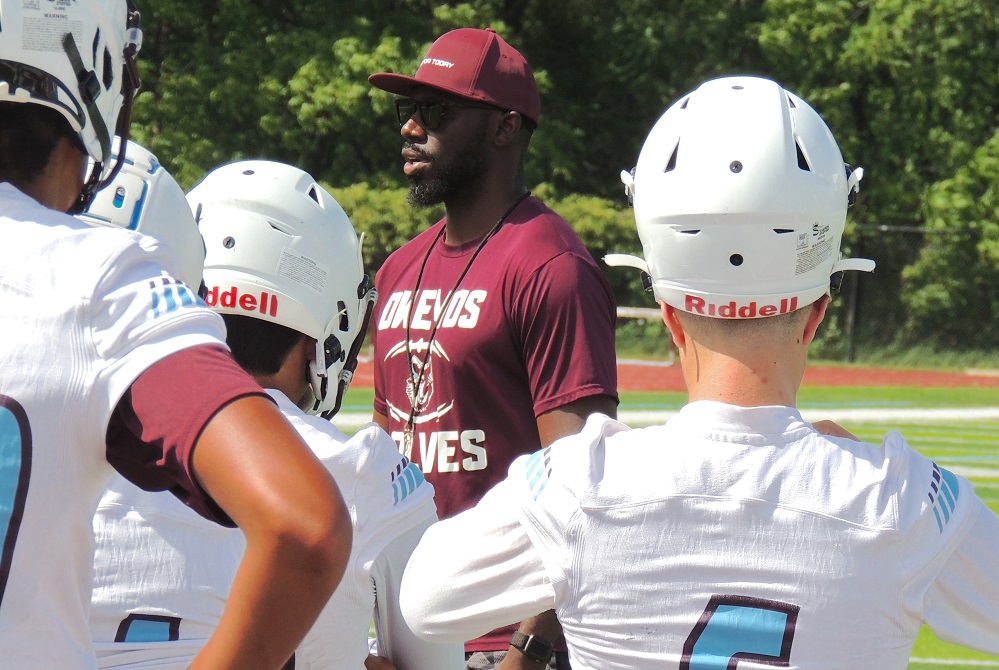
Building Beginning as Okemos Follows 1st-Year Coach Scott-Emuakpor
By
Geoff Kimmerly
MHSAA.com senior editor
August 9, 2022
OKEMOS – The football lay on the turf, landing there before the play had really begun, and the most booming voice from the tallest man on the field yelled a reassuring, “It’s OK. Let’s go,” followed the next play by “Go again,” and then “Figure it out.”
 An hour earlier, first-year Okemos varsity football coach Efe Scott-Emuakpor had been on the phone asking a parent to bring the helmet and practice jersey one of his players had left at home. Nearby, another small group also stood helmetless as they hadn’t yet gotten the pre-participation physical required to join their friends on the field.
An hour earlier, first-year Okemos varsity football coach Efe Scott-Emuakpor had been on the phone asking a parent to bring the helmet and practice jersey one of his players had left at home. Nearby, another small group also stood helmetless as they hadn’t yet gotten the pre-participation physical required to join their friends on the field.
Those are typical first-day glitches no matter the school, and fall practices for all sports began Monday at 750 high schools across the state.
But those relatively minor symptoms are what Scott-Emuakpor is focused on treating in the immediate term as he takes on one of the most serious rebuilding efforts in Michigan high school football.
“This is progress,” Scott-Emuakpor said halfway through his team’s first practice, looking out at 39 players on Okemos’ game field – 33 more than showed up for his first offseason workout.
“We’d like to have everything right now. But it’s growing. It’s slowly growing.”
And after Monday, Okemos is one step closer to what would be an incredible turnaround story.
The Wolves have not won since Week 2 of the 2019 season, a stretch of 23 games. After scoring on an 84-yard run during the first quarter of last fall’s opener against Mason, Okemos didn’t score again the rest of the season.
Standing 6-foot-3, and still only a few years from his last college game as a receiver at Ball State University, Scott-Emuakpor looks capable of stepping back into a huddle at a moment’s notice. A little more than a decade ago, in 2011, he was beginning a senior season at East Lansing that would see him cap his varsity career in the MHSAA record book with 134 catches, gaining 1,624 yards, over three seasons. He also was an all-leaguer in basketball and Finals placer in high jump before joining the Cardinals.
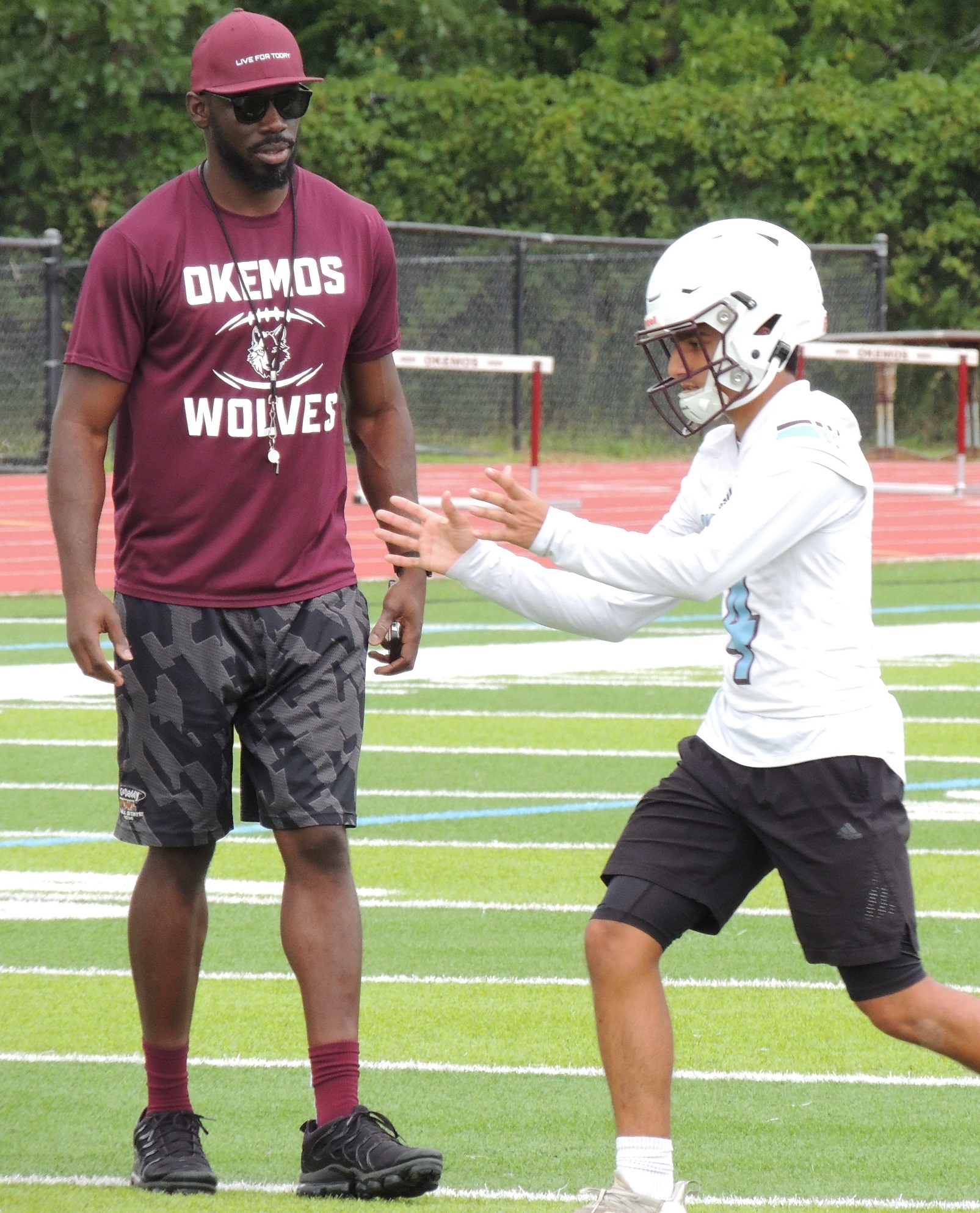 After graduating from Ball State with a computer science bachelor’s degree, and on the way to earning his master’s in business from Saginaw Valley State University, Scott-Emuakpor came home and has worked nearly six years as a business systems analyst with Red Cedar Solutions Group on efforts including the MI School Data website.
After graduating from Ball State with a computer science bachelor’s degree, and on the way to earning his master’s in business from Saginaw Valley State University, Scott-Emuakpor came home and has worked nearly six years as a business systems analyst with Red Cedar Solutions Group on efforts including the MI School Data website.
But that’s just his fulltime job. Scott-Emuakpor also co-founded a clothing line, Live For Today, and over the last five seasons served as a volunteer assistant coach with his hometown Trojans – who have made the MHSAA Playoffs six seasons running.
He'd never applied for a head coaching job. He’d never really considered coaching at that level. In fact, he was pretty happy with how assisting at East Lansing for longtime coach Bill Feraco fit into his schedule and other pursuits.
But Scott-Emuakpor also is a studier. And as a past rival and co-member of the Capital Area Activities Conference Blue, he and East Lansing saw Okemos plenty.
The Wolves had made the playoffs as recently as 2018, and won their first playoff game that season since 2011. Scott-Emuakpor had played against Okemos’ Taylor Moton, now considered one of the NFL’s top offensive tackles. And the school has had loads of success in other sports, annually ranking among the Lansing area’s best in just about all of them and coming off a statewide Division 1 championship in boys soccer from last fall.
“I paid attention to how things have been around here. And I know what they could be capable of,” Scott-Emuakpor said. “This program was once a good program that was very well-respected; I respected them playing against them in high school. They had great athletes. I think my senior year we beat them by one point (20-19 in 2011). So we had good battles.
“I just saw where they’re at. … We have some good kids around here, and I know there’s more in the school not playing. Maybe when they’re sophomores, juniors, they’ll come out. I think I’m capable of getting that interest up, getting them out on the field and just building something.”
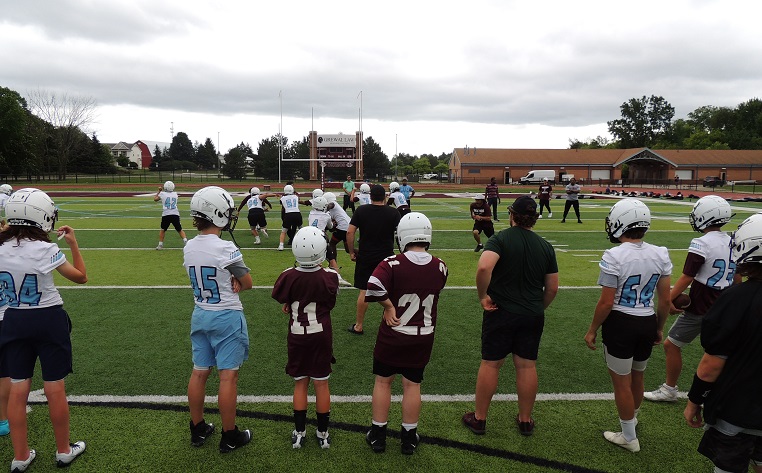 Raj Singh is a senior this fall, one of only five or so Scott-Emuakpor is expecting to come out this week. He’s also a near all-A student, will play some quarterback and safety along with his receiver spot, and was the guy bringing carloads of classmates to workouts over the summer as he joined his coach in recruiting prospective players.
Raj Singh is a senior this fall, one of only five or so Scott-Emuakpor is expecting to come out this week. He’s also a near all-A student, will play some quarterback and safety along with his receiver spot, and was the guy bringing carloads of classmates to workouts over the summer as he joined his coach in recruiting prospective players.
Singh is following his older brother Joe Singh, an admittedly “smaller than everyone” offensive lineman who earned all-league honors as a senior in 2017. When Joe Singh told his younger brother that playing under the lights on a Friday night is a feeling unlike any other, the idea stuck – which is why it made sense when Raj Singh fractured his wrist in Week 2 last season but was back by Week 7 despite a cast covering one hand.
Watching Singh catch passes one-handed last season during East Lansing’s 49-0 win over Okemos stuck with Scott-Emuakpor. Joe Singh had told his little bother that all that matters is having more heart than his opponent and a fighting spirit – in other words, being the type of player Scott-Emuakpor will rely on to get Okemos up and succeeding again.
“I’ve been playing football since I was 6 years old. It’s just been a dream of mine to be at this moment,” Raj Singh said.
“Coach Efe is bringing in a lot of new aspects, and that’s been very helpful to make it different than last year – make us feel a little more at home this year. Compared to last year, he’s brought a lot of structure. We’ve been really coming together as a family … and it just shows Coach Efe wants to build a community around here.”
The process is about more than building stronger, faster bodies and learning football skills and technique. The Wolves aren’t talking a lot about last year, but there’s something there to overcome – and Scott-Emuakpor started working on that soon after he was hired at the end of March.
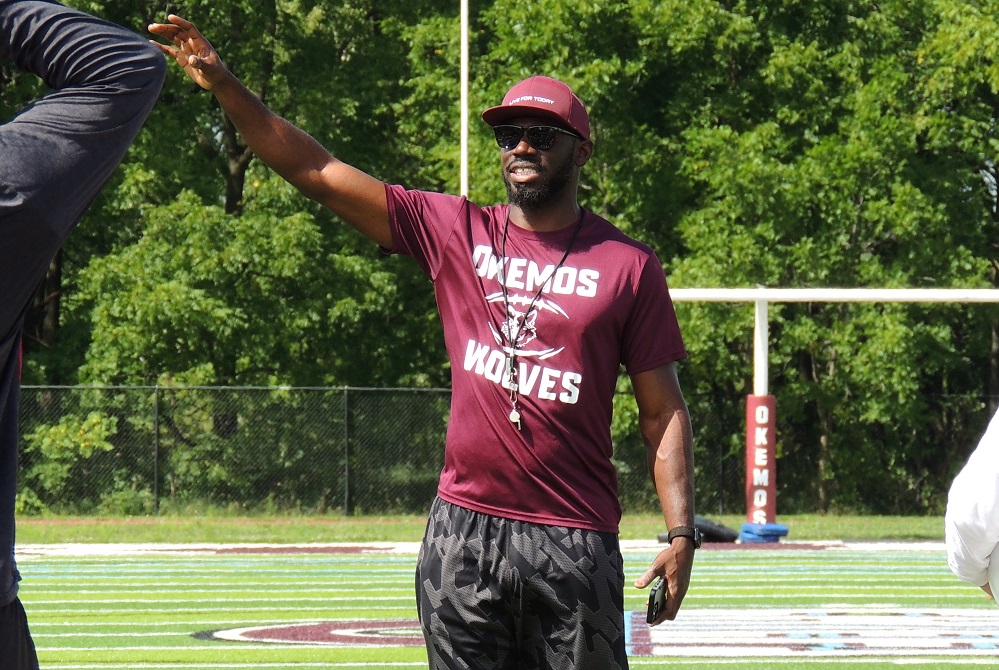 “In the springtime, we were fortunate enough to get in the weight room and I was able to see kids put up good weight and do some things. I’d tell them, ‘You’re actually strong. You’re actually a fast kid,’” Scott-Emuakpor said. “But when you’re not successful for so long, and the way they were losing last year, it was easy for them to not feel confident, not feel they were able to ultimately get the job done. And so I was just there working on minds.”
“In the springtime, we were fortunate enough to get in the weight room and I was able to see kids put up good weight and do some things. I’d tell them, ‘You’re actually strong. You’re actually a fast kid,’” Scott-Emuakpor said. “But when you’re not successful for so long, and the way they were losing last year, it was easy for them to not feel confident, not feel they were able to ultimately get the job done. And so I was just there working on minds.”
Last season was going to be uphill for Okemos no matter what. A mid-summer coaching change brought on by a major fulltime job promotion for the former coach led to an interim staff, players leaving the program, and an applaudable effort to just keep teams on the field.
Scott-Emuakpor has surrounded himself with a staff that includes a pair of his past coaches growing up in East Lansing, past players from when he was coaching there and others with winning experience playing at DeWitt and Williamston.
In addition to what he learned playing and coaching under Feraco, Scott-Emuakpor brings a ton of insight from his experiences at Ball State; he had only one catch during his college career while battling injuries, but he spent that time on the sideline observing his coaches and taking mental notes. Just Sunday, he was pulling from the 2012-13 Ball State football handbook a few details to incorporate into his work in progress with the Wolves.
Okemos will have varsity and freshman teams this fall, and the majority of players at Monday’s combined practice were juniors and sophomores – so recruiting remains ongoing. But Singh said the number of classmates who did come out Monday exceeded his expectations – and that just added to the excitement of starting again.
“If you walk through the school, you’ll see some guys, you’ll (say), ‘OK, what does that guy do?’ You find out he plays (only) lacrosse, or only wrestles, where in other areas, other schools, they might do everything because that’s what they do, what they’ve grown up doing” Scott-Emuakpor said. “I’ve been trying to rebuild that connection, that love for football. A lot of them are very intrigued; I feel like some of them are kinda peeking and saying, ‘What’s going on? This new coach seems to be young and interesting.’ And I’ve just been trying to stay focused on the process and not get too far ahead of myself.”
 Geoff Kimmerly joined the MHSAA as its Media & Content Coordinator in Sept. 2011 after 12 years as Prep Sports Editor of the Lansing State Journal. He has served as Editor of Second Half since its creation in January 2012, and MHSAA Communications Director since January 2021. Contact him at [email protected] with story ideas for the Barry, Eaton, Ingham, Livingston, Ionia, Clinton, Shiawassee, Gratiot, Isabella, Clare and Montcalm counties.
Geoff Kimmerly joined the MHSAA as its Media & Content Coordinator in Sept. 2011 after 12 years as Prep Sports Editor of the Lansing State Journal. He has served as Editor of Second Half since its creation in January 2012, and MHSAA Communications Director since January 2021. Contact him at [email protected] with story ideas for the Barry, Eaton, Ingham, Livingston, Ionia, Clinton, Shiawassee, Gratiot, Isabella, Clare and Montcalm counties.
PHOTOS (Top) First-year Okemos varsity football coach Efe Scott-Emuakpor, middle, huddles up his players during Monday's first day of practice. (2) Scott-Emuakpor confers with senior Raj Singh on blocking from his receiver position. (3) The Wolves work on offense during the first part of their Monday session. (4) Scott-Emuakpor speaks with his team at the start of the workout. (Photos by Geoff Kimmerly.)

